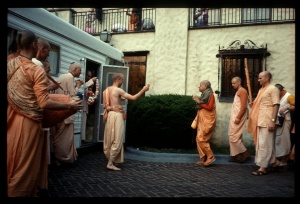CC Adi 7.20-21 (1975): Difference between revisions
(Vanibot #0027: CCMirror - Mirror CC's 1996 edition to form a basis for 1975) |
(Vanibot #0020: VersionCompareLinker - added a link to the Version Compare feature) |
||
| Line 2: | Line 2: | ||
<div style="float:left">'''[[Sri Caitanya-caritamrta (1975)|Śrī Caitanya-caritāmṛta (1975)]] - [[CC Adi (1975)|Ādi-līlā]] - [[CC Adi 7 (1975)|Chapter 7: Lord Caitanya in Five Features]]'''</div> | <div style="float:left">'''[[Sri Caitanya-caritamrta (1975)|Śrī Caitanya-caritāmṛta (1975)]] - [[CC Adi (1975)|Ādi-līlā]] - [[CC Adi 7 (1975)|Chapter 7: Lord Caitanya in Five Features]]'''</div> | ||
<div style="float:right">[[File:Go-previous.png|link=CC Adi 7.18-19 (1975)|Ādi-līlā 7.18-19]] '''[[CC Adi 7.18-19 (1975)|Ādi-līlā 7.18-19]] - [[CC Adi 7.22 (1975)|Ādi-līlā 7.22]]''' [[File:Go-next.png|link=CC Adi 7.22 (1975)|Ādi-līlā 7.22]]</div> | <div style="float:right">[[File:Go-previous.png|link=CC Adi 7.18-19 (1975)|Ādi-līlā 7.18-19]] '''[[CC Adi 7.18-19 (1975)|Ādi-līlā 7.18-19]] - [[CC Adi 7.22 (1975)|Ādi-līlā 7.22]]''' [[File:Go-next.png|link=CC Adi 7.22 (1975)|Ādi-līlā 7.22]]</div> | ||
{{CompareVersions|CC|Adi 7.20-21|CC 1975|CC 1996}} | |||
{{RandomImage}} | {{RandomImage}} | ||
| Line 8: | Line 9: | ||
<div class="verse"> | <div class="verse"> | ||
:sei pañca-tattva | :sei pañca-tattva mili' pṛthivī āsiyā | ||
:pūrva-premabhāṇḍārera mudrā ughāḍiyā | :pūrva-premabhāṇḍārera mudrā ughāḍiyā | ||
:pāṅce | :pāṅce mili' luṭe prema, kare āsvādana | ||
:yata yata piye, tṛṣṇā bāḍhe anukṣaṇa | :yata yata piye, tṛṣṇā bāḍhe anukṣaṇa | ||
</div> | </div> | ||
| Line 18: | Line 19: | ||
<div class="synonyms"> | <div class="synonyms"> | ||
sei—those; pañca-tattva—five truths; | sei—those; pañca-tattva—five truths; mili'-combined together; pṛthivī—on this earth; āsiyā—descending; pūrva—original; prema-bhāṇḍārera—the store of transcendental love; mudrā—seal; ughāḍiyā—opening; pāṅce mili'-mixing together all these five; luṭe—plunder; prema—love of Godhead; kare āsvādana—taste; yata yata—as much as; piye—drink; tṛṣṇā—thirst; bāḍhe—increases; anukṣaṇa—again and again. | ||
</div> | </div> | ||
| Line 25: | Line 26: | ||
<div class="translation"> | <div class="translation"> | ||
The characteristics of Kṛṣṇa are understood to be a storehouse of transcendental love. Although that storehouse of love certainly came with Kṛṣṇa when He was present, it was sealed. But when Śrī Caitanya Mahāprabhu came with His associates of the Pañca-tattva, they broke the seal and plundered the storehouse to taste transcendental love of Kṛṣṇa. The more they tasted it, the more their thirst for it grew. | The characteristics of Kṛṣṇa are understood to be a storehouse of transcendental love. Although that storehouse of love certainly came with Kṛṣṇa when He was present, it was sealed. But when Śrī Caitanya Mahāprabhu came with His other associates of the Pañca-tattva, they broke the seal and plundered the storehouse to taste transcendental love of Kṛṣṇa. The more they tasted it, the more their thirst for it grew. | ||
</div> | </div> | ||
==== PURPORT ==== | ==== PURPORT ==== | ||
<div class="purport"> | <div class="purport"> | ||
Śrī Caitanya Mahāprabhu is called mahā-vadānyāvatāra because although He is Śrī Kṛṣṇa Himself, He is even more favorably disposed to the poor fallen souls than Lord Śrī Kṛṣṇa. When Lord Śrī Kṛṣṇa Himself was personally present | Śrī Caitanya Mahāprabhu is called mahā-vadānyāvatāra because although He is Śrī Kṛṣṇa Himself, He is even more favorably disposed to the poor fallen souls than Lord Śrī Kṛṣṇa. When Lord Śrī Kṛṣṇa Himself was personally present He demanded that everyone surrender unto Him and promised that He would then give one all protection, but when Śrī Caitanya Mahāprabhu came to this earth with His associates, He simply distributed transcendental love of God without discrimination. Śrī Rūpa Gosvāmī, therefore, could understand that Lord Caitanya was none other than Śrī Kṛṣṇa Himself, for no one but the Supreme Personality of Godhead can distribute confidential love of the Supreme Person. | ||
</div> | </div> | ||
Latest revision as of 19:24, 26 January 2020

A.C. Bhaktivedanta Swami Prabhupada
TEXTS 20-21
- sei pañca-tattva mili' pṛthivī āsiyā
- pūrva-premabhāṇḍārera mudrā ughāḍiyā
- pāṅce mili' luṭe prema, kare āsvādana
- yata yata piye, tṛṣṇā bāḍhe anukṣaṇa
SYNONYMS
sei—those; pañca-tattva—five truths; mili'-combined together; pṛthivī—on this earth; āsiyā—descending; pūrva—original; prema-bhāṇḍārera—the store of transcendental love; mudrā—seal; ughāḍiyā—opening; pāṅce mili'-mixing together all these five; luṭe—plunder; prema—love of Godhead; kare āsvādana—taste; yata yata—as much as; piye—drink; tṛṣṇā—thirst; bāḍhe—increases; anukṣaṇa—again and again.
TRANSLATION
The characteristics of Kṛṣṇa are understood to be a storehouse of transcendental love. Although that storehouse of love certainly came with Kṛṣṇa when He was present, it was sealed. But when Śrī Caitanya Mahāprabhu came with His other associates of the Pañca-tattva, they broke the seal and plundered the storehouse to taste transcendental love of Kṛṣṇa. The more they tasted it, the more their thirst for it grew.
PURPORT
Śrī Caitanya Mahāprabhu is called mahā-vadānyāvatāra because although He is Śrī Kṛṣṇa Himself, He is even more favorably disposed to the poor fallen souls than Lord Śrī Kṛṣṇa. When Lord Śrī Kṛṣṇa Himself was personally present He demanded that everyone surrender unto Him and promised that He would then give one all protection, but when Śrī Caitanya Mahāprabhu came to this earth with His associates, He simply distributed transcendental love of God without discrimination. Śrī Rūpa Gosvāmī, therefore, could understand that Lord Caitanya was none other than Śrī Kṛṣṇa Himself, for no one but the Supreme Personality of Godhead can distribute confidential love of the Supreme Person.